The choice to get tatted did not come lightly- a lot of thought and research went into it. How do tattoos impact autoimmunity (and our immune system)? How is my body going to react to this stressor? While not everyone has the same experience- I really feel I have grown more resilient with each tattoo. Cool right? There is actually data that supports this experience. Read on to hear my story & learn a little bit about how tattoos and the immune system interact.
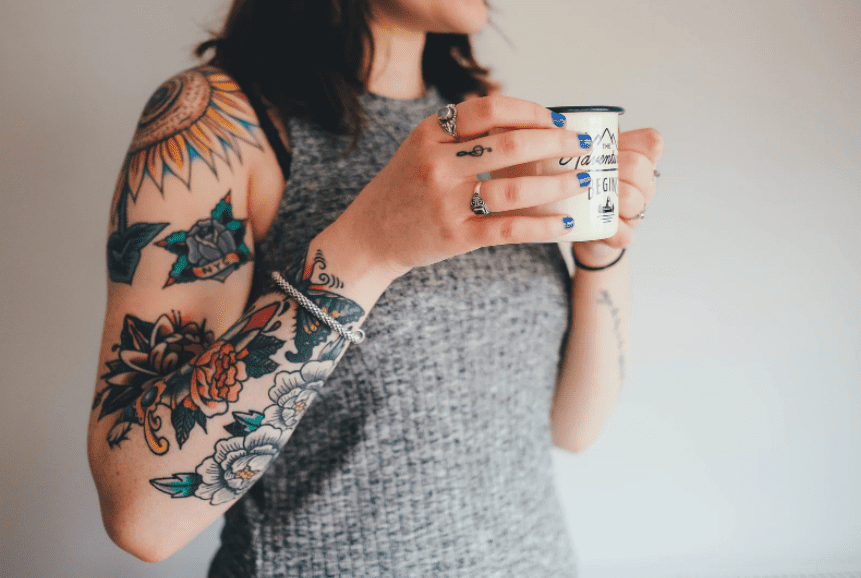
The body’s response to tattooing is akin to that experienced from exercising in the gym when you’re out of shape, said Lynn. Initially, muscles become sore, but if you continue, the soreness fades following subsequent workouts […] You’re getting stronger.
ScienceDaily
Tattoo 101
For those of you who don’t have tattoos or are just beginning to consider getting one- let’s just briefly talk about what they are and what we generally know about them.
Tattoos have a rich history in human culture. Ornamentation of the body is ancient. We love to make ourselves look pretty & powerful in whatever way is significant to us.
A tattoo is a permanent mark or design made on your skin with pigments inserted through pricks into the skin’s top layer. While there are various traditional and modern-day practices for how to accomplish this design, these days the tattoo artist typically uses a hand-held machine that acts much like a sewing machine, with one or more needles piercing the skin repeatedly. With every puncture, the needles insert tiny ink droplets. Next, let’s dive into tattoos and the immune system. But first, let me clarify that this post isn’t meant to be medical advice or to tell you that getting one will be safe for you or not.
The Data on Tattoos & Immune Function
So if begin to go down the rabbit hole of the impact tattoos have on the immune system- you’ll find that there are two main studies that several articles reference. Both of these studies- and a lot of the research- done in this area, are led by Christopher D. Lynn- a researcher at the University of Alabama with expertise in biocultural medical anthropology. Considering that tattoos are an ancient cultural practice, Lynn felt like there had to be something deeper going on at a biological & evolutionary level.
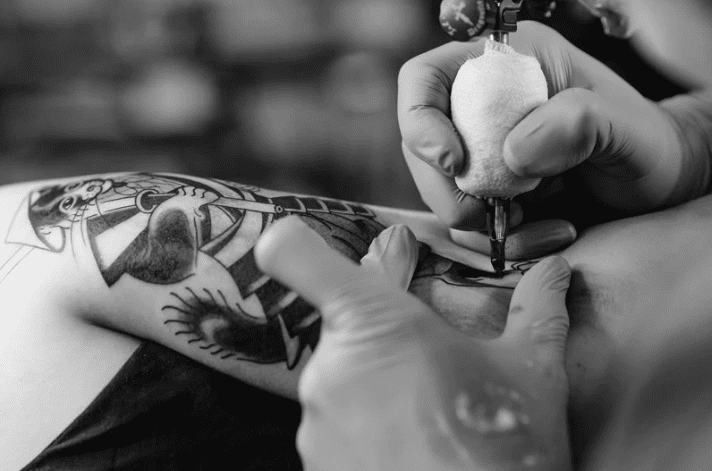
Study #1: Tattooing to “Toughen up”
Getting a tattoo can be objectively described as acute stress on the body. Whether you are excited or nervous or both- it is basically a choice to sustain a minor injury for the sake of art and self-expression. When we experience acute stress- a few things happen. There is an immediate release of IGA, activating the immune system, followed by a release of cortisol 30-60 minutes after the onset of the stressor, which suppresses the immune response and returns it to baseline.
This study wanted to test the hypothesis that the immune system adapts to the stress of tattoos in bodies that have been repeatedly tattooed and thus there would be less immunosuppression in those with more tattoo experience. In other words, they wanted to prove that there is a positive feedback loop between getting tatted and your body’s immune response to getting tatted- the stress would not be experienced intensely enough to trigger immunosuppression, and instead your immune system would get a bump up.
In order to test this hypothesis they collected saliva samples, before and after the tattoo experience, of Immunoglobulin A & Cortisol:
Immunogobulin A (IGA): An antibody that fights infection, predominantly in the mucous membranes
Cortisol: The body’s main stress hormone that is present in varying degrees throughout the day and specifically released in moments of acute stress.
Additionally, they asked several questions and recorded information regarding how many tattoo experiences participants had- taking into account how large these tattoos are.
The results showed the following:
- Immunoglobulin A dropped significantly in people receiving their first tattoo. However, people with a large number of tattoos had smaller decreases.
- Furthermore, some folks with even more tattoo experiences under their belt had an increase in IGA
In a nutshell, these results suggest that the body can adjust to the stress of getting a tattoo and that it might actually improve immune response. While it might be a leap to claim tattoos improve overall immune function in fighting illness- it is still significant that for some, tattoos offer an experience to build up immune system resilience in the face of stress. Still a very interesting connection between tattoos and the immune system.
Because this study was conducted with young, white, middle-class women mainly, Lynn himself acknowledges that this study was too small and limited in demographic to make wide-sweeping claims. He felt it was important to research this same link in populations with a more varied demographic and in a cultural cohort with more extensive tattoo experiences. Enter Study #2.
“Tattooing seems to exert a priming effect: That’s what biologists call it when naïve immune cells are exposed to their specific antigen and differentiate into antibodies that remain in the bloodstream for many years. Each tattoo prepares the body to respond to the next.”
Christopher D. Lynn

Study #2: The Evolutionary Adaptation of Body Art
With the knowledge that tattooing potentially habituates the body for subsequent stress- Lynn and his team decided to conduct a similar test in American Samoa- where tattooing has deep cultural roots, is practiced extensively, and where the rates of infectious diseases are high.
The continuous and extensive cultural practice of tattooing in traditional Samoan culture and currently in American Samoa is intimately tied to social identity, spirituality, and the development of thoughtful leaders. It is a sacred and long-held tradition that holds meaning beyond aesthetics.
For this study, Lynn’s team worked with the hypothesis that those with more tattoo experience would have an “enhanced immune response related to the stress of being tattooed.” Controlling for baseline health with a variety of markers (cortisol, BMI, CRP, and cigarette use), they measured Immunoglobulin A to compare levels before and after a tattoo experience.
The results found that post-tattoo Immunoglobulin A positively correlated with total tattoo experience. Meaning, those that who had more extensive tattoo experience, consistently demonstrated higher immune system activity post-tattoo. Again, while the degree of clinical relevance here is variable, there is a strong suggestion toward immune habituation to repeated tattooing.
Our findings support a model for tattoos as a signal of immunocompetence and physical stamina. The persistent notion that tattooing is a visible embodiment of resilience is supported by the positive relationship between total tattooing experience and SIgA. This research is important because of the contemporary, historical, and cultural ubiquity of tattooing.
Christopher D. Lynn
In the context of American Samoa specifically- and as applied to homologous communities- the results of this study posit that perhaps “higher baseline (pre-tattoo) immune levels and quicker rise in circulating antibodies in response to getting a new tattoo may be a mechanism of ‘costly honest fitness signaling’ and an adaptation for populations experiencing high disease burdens.”
What does that all mean for tattoos and the immune system?
Well, it means that from an evolutionary standpoint, tattoos can serve as indicators of strength and health. So while there is a ‘cost’ (read: pain/injury), increased tattoo experiences could also serve as indicators of ‘fitness signaling’ (read: biological markers of health). Furthermore, there is the potential promise of higher immune resistance to other forms of dermal stress in the form of viruses and bacteria- which is very exciting.

My Autoimmune and Tattoo Story
Reading these studies and the discussions surrounding them have been super affirming of my already embodied experience. While I try to keep the ‘woo’ in check and balance my manifestation vibes with the realities of structural systems of oppression- I wholeheartedly believe that how we feel about ourselves and experience our bodies has a huge impact on our actual health. There is power and tangible physiological benefits to doing things that make you feel more badass and good about yourself.
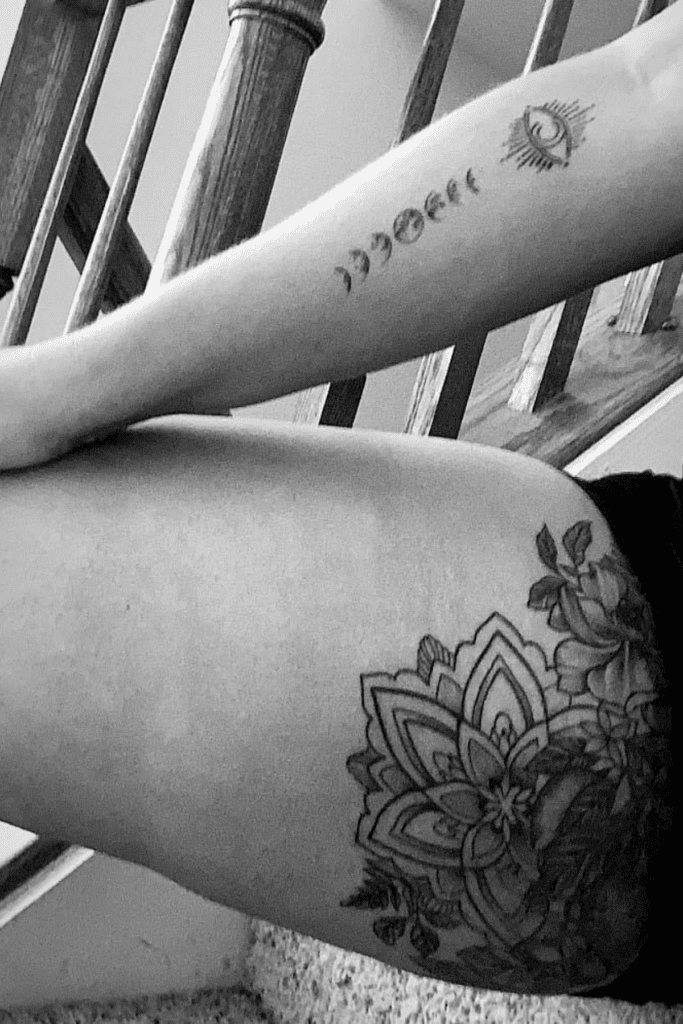
My first tattoo was my paper boat logo, yup the little boat on the top of my home page. It’s on my right arm, just below the inside of my elbow. It took no more than 15 minutes to tattoo. It healed perfectly, with no raising or swelling, no flare-up.
Almost 2 years later I got 2 more tattoos, also simple designs on my other forearm. Again, easy, no issue. It wasn’t until I decided to tattoo over my hidradenitis suppurativa scars that I really began to see the impact of the tattoos making my skin less reactive.
You see, I have scars on my inner thighs and under my arms, and even under my breasts due to living with active HS for 18 years. After healing my body, my gut, and my mind, I found remission and was able to maintain it for several years. I needed to heal my soul, the trauma of living with this disease, I wanted to empower myself to not let 18 years of chronic illness continue to dictate my self-esteem. I would create art from places in my body that were a source of strife.
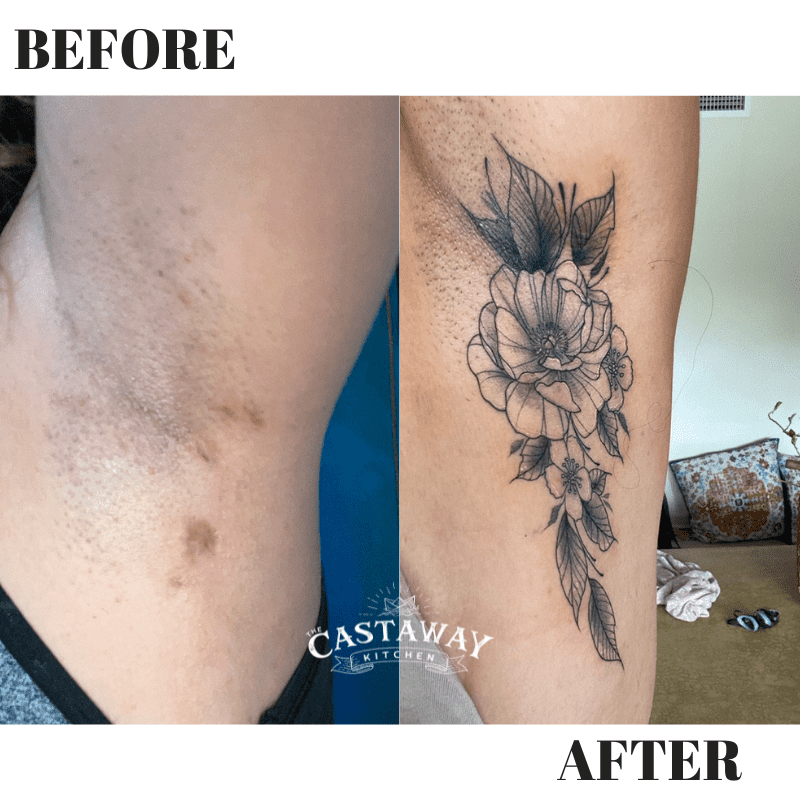
This is when I went from 0-60 with the ink. Over the course of 2021, I went from 3 small tattoos, all of which had taken no more than 15 minutes, to 3 large pieces which all took several hours. Some major real estate on my body was now covered in ink. In this YouTube video, I talk about how I prepped my the skin for the trauma of the tattoo.
I started with the armpit tattoo because those scars were mild and I had been in remission there the longest. But let me tell you, even when I went in for my inner thighs, where my skin was severely damaged, I was surprised at how well I healed and how much healthier my skin has been in that area ever since. I don’t even get ingrown hairs anymore!
Other Stories
This website chronicles the stories of powerful people who chose to get tattoos to work through mental and emotional hardship.
While I haven’t been able to find clear evidence that links the emotional-mental relationship people have with tattoos with the immune system benefits described in Lynn’s studies, the connection feels pretty intuitive to me. It’s no secret that trauma and chronic life stress is linked to disease. For so many- and for myself- tattoos begin as a cathartic way to process/release/celebrate something you have gone through. I think that decision alone shows growth and resilience- add in the physiological benefits of stimulating the body through ink repeatedly- and it makes so much sense that these works of art are making people feel stronger physically AND emotionally.

Practical Tips & Info
Now, let’s be clear that all this talk about tattoos having the capacity to support your immune response & resilience and cultivate an increased sense of well-being and fortitude is in the context of safe & sanitary conditions. I don’t want to downplay the fact that there are real risks to working with this modality. Here are some things to keep in mind when choosing to get tatted so that you can have a positive experience:
- Research the kind of ink that your artist uses. Quality does matter. For example, I stick to black ink because of my research (like this article and this article)! it has the least amount of additives.
- Make sure the artist is reliable and safe by checking out reviews or talking to people who have worked with them before.
- Research your artist- make sure they are Blood-borne pathogen certified and that both the artist and the studio are licensed
- Bring a friend or trusted person with you for your appointment (this can be complicated in these times but maybe plan to facetime with someone if that feels good for you)
- Ask about sanitation practices used at your tattoo shop i.e.: single-use equipment, clean gloves, etc.
- If you get weird vibes or something doesn’t seem clean enough, skip it.
- Make sure to follow after-care instructions for your tat
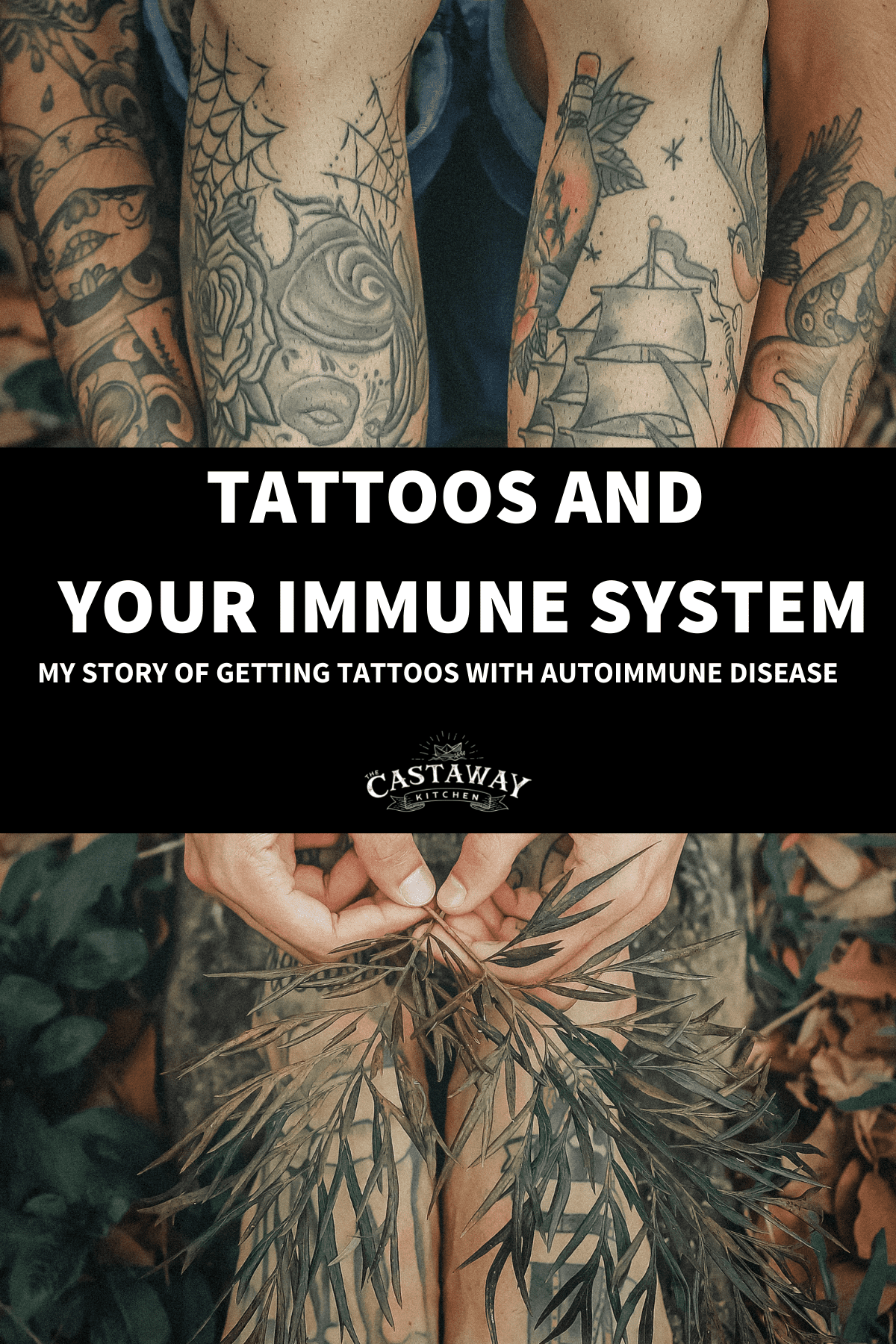





Tori Cutrell says
Very eloquently written and love that it is backed up with research.
I love your story and why you have chosen to get tattoos. I also love that you discuss the link that tattoos have with mental illness and chronic illness. That is why I have 2 of my tattoos and the reason for my next 2.
Thank you for sharing!
Julie says
Thoroughly researched, beautifully written, and inspiring! Also fyi the subtitle in the last image is missing the second “o” in “tatoos” 😉
Christine E says
Very interesting research and great to hear more of your personal journey. Thanks for sharing.
John Himmelberger says
Totally disagree, the body is a temple and should not be grafitti’d
Cristina Curp, FNTP says
I wasn’t asking, John.